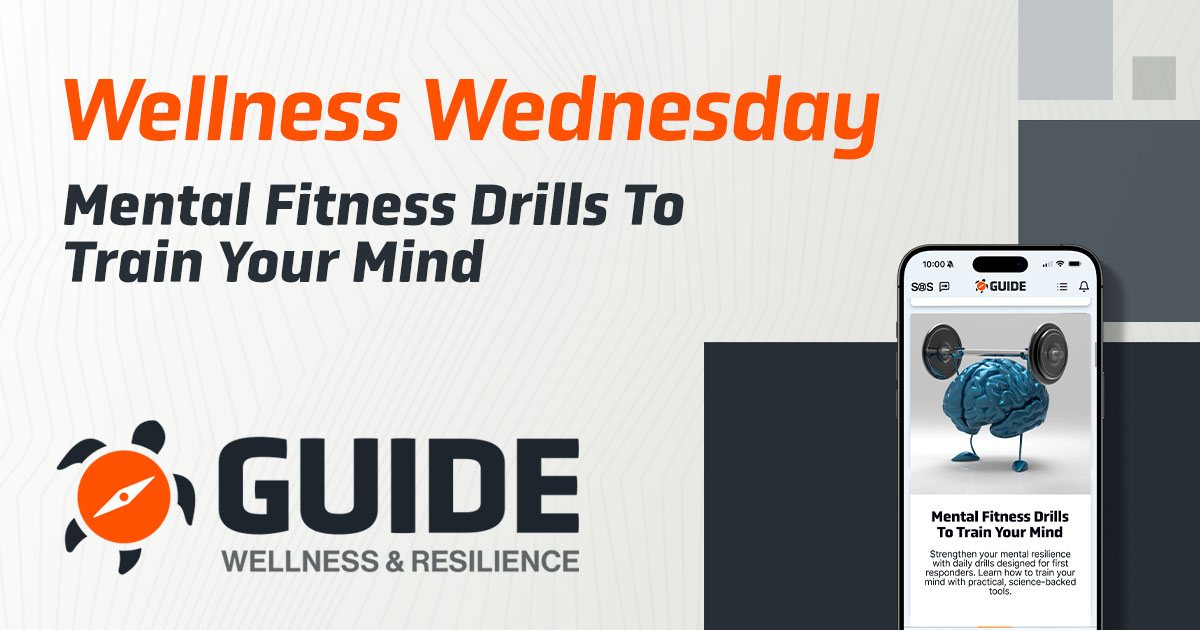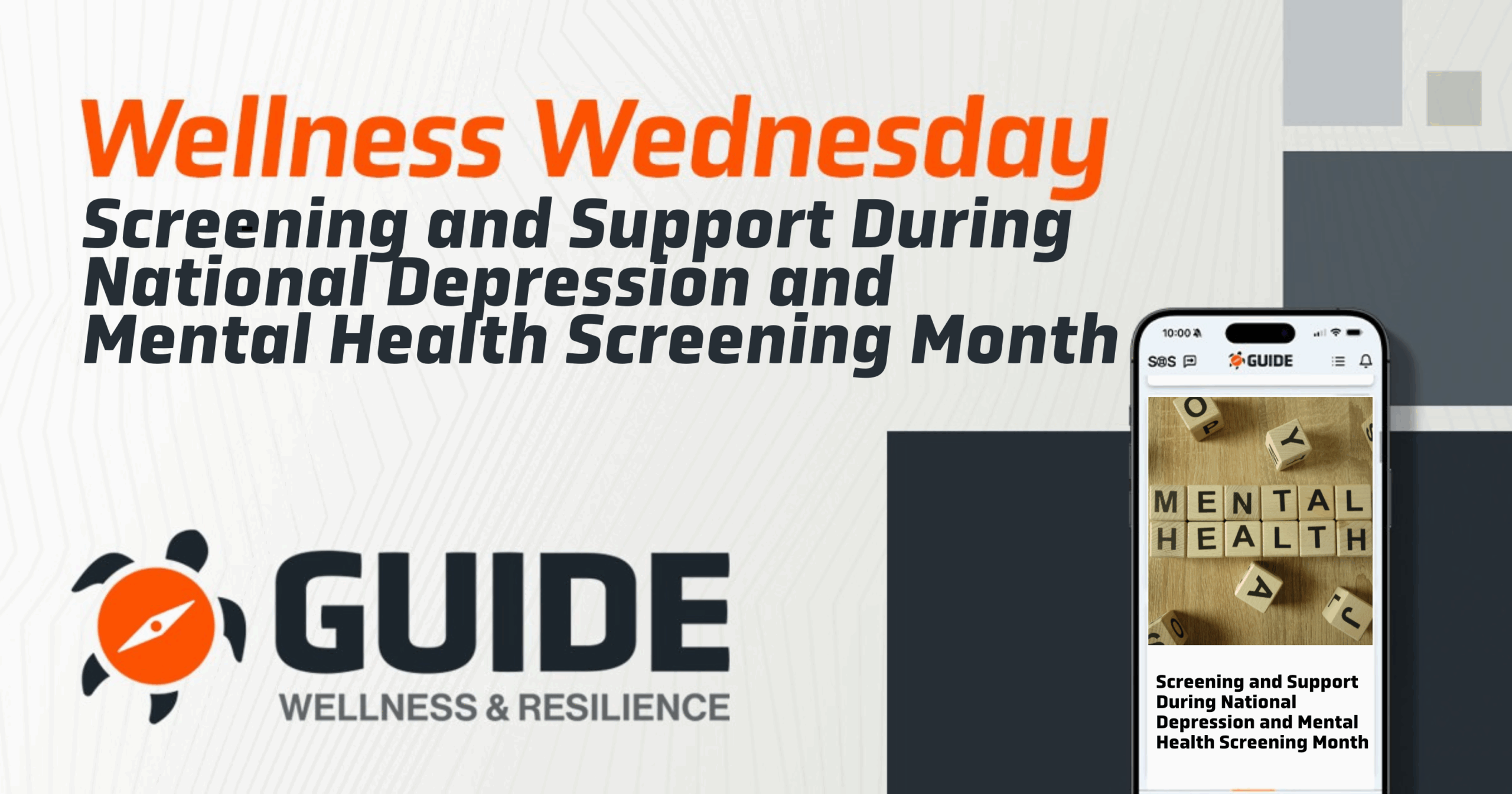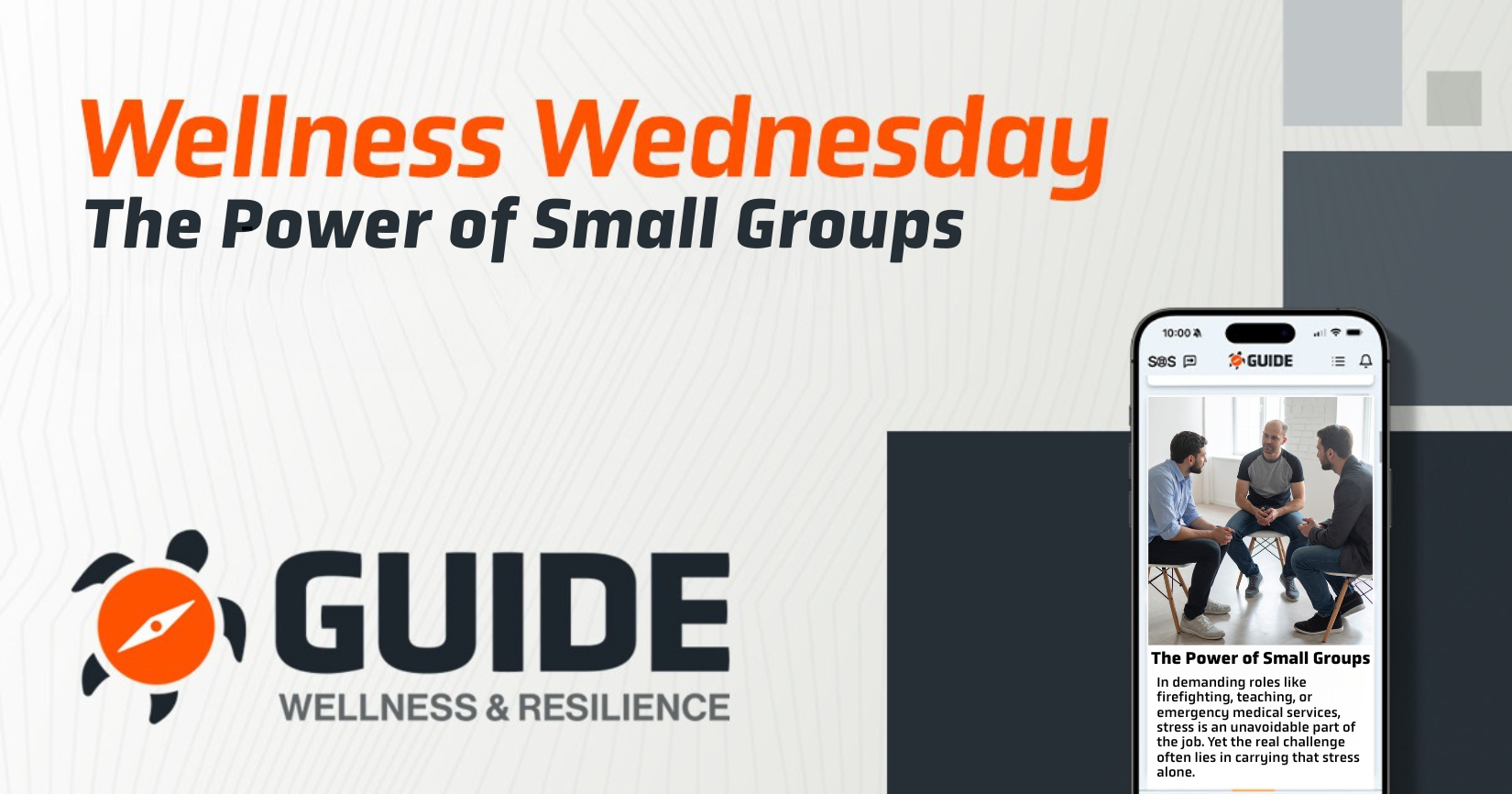As a first responder or frontline worker, you train hard to stay physically fit. But what about your mental fitness?
When the pressure’s on, it’s not just your body that needs to perform—it’s your mind. Mental fitness is just as important as physical strength. It helps you stay calm under stress, make smart decisions, bounce back from hard situations, and support the people around you.
The good news? Just like you can train your muscles, you can train your mind. This week’s Wellness Wednesday is all about mental fitness drills—simple tools you can use every day to keep your brain sharp, focused, and emotionally strong.
What Is Mental Fitness?
Mental fitness is your ability to stay clear-headed, emotionally steady, and focused—even when things get tough.
It’s about:
- Managing stress without shutting down
- Thinking clearly under pressure
- Controlling your emotions without ignoring them
- Bouncing back after tough calls or long shifts
- Staying positive without pretending everything’s okay
Just like physical fitness helps prevent injury, mental fitness helps protect you from burnout, anxiety, and emotional overload.
Why Mental Fitness Matters for First Responders
Your job is high-stress and high-stakes. You deal with trauma, uncertainty, and long hours. Over time, that takes a toll. Mental fitness drills help you:
✅ Stay in control during chaos
✅ Recover faster from tough moments
✅ Improve team communication and trust
✅ Protect your energy and emotional health
✅ Perform at your best—even on the hardest days
When your mind is strong, you stay steady—even when everything around you isn’t.
Mental Fitness Drills You Can Start Using Today
Below are eight simple drills you can practice on or off shift. They’re quick, effective, and easy to fit into your day—even during busy schedules.
1. Box Breathing (Tactical Breathing)
This drill calms your nervous system fast and brings your focus back.
How to do it:
- Inhale for 4 seconds
- Hold for 4 seconds
- Exhale for 4 seconds
- Hold again for 4 seconds
Repeat 3–4 rounds
Use when:
You’re feeling overwhelmed, before walking into a scene, or after a stressful moment.
2. Mental Reps: Positive Self-Talk
Your thoughts affect your performance. Train your brain to talk to you like a coach, not a critic.
Try saying:
- “I’ve done this before. I can do it again.”
- “I don’t have to be perfect—I just have to stay steady.”
- “One call at a time. One breath at a time.”
Use when:
You’re feeling discouraged, angry, or anxious.
3. Visualization Practice
Athletes use this tool. You can too. Picture yourself staying calm, clear, and focused during a stressful moment.
How to do it:
- Close your eyes
- Picture a situation (like responding to a high-pressure call)
- Visualize yourself breathing calmly, speaking clearly, and handling it with confidence
- Replay it like a mental movie for 2–3 minutes
Use when:
Preparing for a shift, a meeting, or a known stressor.
4. Mental Reset: The 5-4-3-2-1 Grounding Drill
This drill pulls your mind out of racing thoughts and back into the present moment.
How to do it:
- Name 5 things you can see
- Name 4 things you can feel
- Name 3 things you can hear
- Name 2 things you can smell
- Name 1 thing you can taste
Use when:
You’re feeling anxious or emotionally flooded.
5. Focus Builder: Counted Breaths
This drill clears brain fog and builds attention control.
How to do it:
- Inhale and count “one” in your mind
- Exhale and count “two”
- Keep going up to 10
- If your mind wanders, start over at one
Use when:
You’re distracted, frustrated, or need to refocus.
6. Mental Recharge: Gratitude Reflection
Gratitude is a mental muscle. Strengthen it with small, daily reps.
How to do it:
- Name 1–2 things you’re thankful for today
- They can be big or small (e.g., a safe shift, a kind teammate, a quiet moment)
Use when:
You’re winding down after a shift or need a mood reset.
7. The “What’s In My Control?” Drill
This helps you stop spiraling over things you can’t change.
Ask yourself:
- What can I control right now?
- What do I need to accept?
- What’s one next step I can take?
Use when:
You feel stuck, overwhelmed, or frustrated.
8. After-Action Mental Debrief
This is like a quick check-in after a tough call or situation.
Ask yourself:
- What did I do well?
- What was hard?
- What do I need to let go of before moving on?
Use when:
You’re coming off a call, ending a shift, or heading home.
How to Make Mental Fitness Part of Your Routine
You don’t need to do all of these drills every day. Just pick 1–2 that speak to you, and repeat them often. That’s how habits are built—through consistency, not perfection.
✅ Add to transitions:
Do a breathing drill before walking into work, starting a call, or finishing a report.
✅ Stack with daily habits:
Practice a gratitude reflection while brushing your teeth or doing end-of-shift tasks.
✅ Write down go-to drills:
Keep a small card in your pocket or note on your phone with your favorite mental reps.
✅ Lead by example:
Use mental fitness drills with your crew or encourage team check-ins during downtime.
Signs Your Mental Fitness Is Getting Stronger
You might not notice results right away—but over time, these changes start to show:
- You feel more present and focused
- You bounce back faster after stressful moments
- You stay calmer in chaos
- You handle emotions without avoiding or exploding
- You catch negative thoughts before they take over
It’s not about “feeling great all the time”—it’s about staying mentally ready for whatever comes next.
What If You’re Struggling to Stay Mentally Strong?
First of all, you’re not alone. Some seasons are harder than others. Mental fitness drills help—but they aren’t a replacement for talking to someone when things feel heavy.
That’s not weakness. That’s maintenance.
Reach out to:
- A peer support team
- A counselor or coach
- A friend or partner who listens without judgment
- Confidential mental health resources available through your department
Mental strength includes knowing when to rest, when to reset, and when to ask for help.
You train your body to stay mission-ready. Now it’s time to train your mind the same way.
Start small. One drill at a time. One breath at a time. You’re not just building mental fitness—you’re building long-term strength, clarity, and control that will serve you in every part of your life.
This isn’t about being perfect. It’s about staying prepared.
Because your mind matters. And it’s worth protecting.




